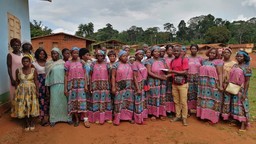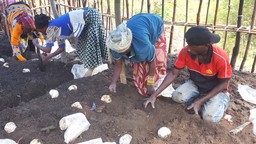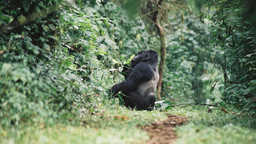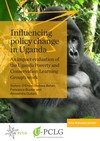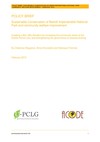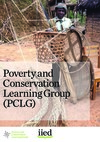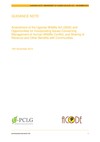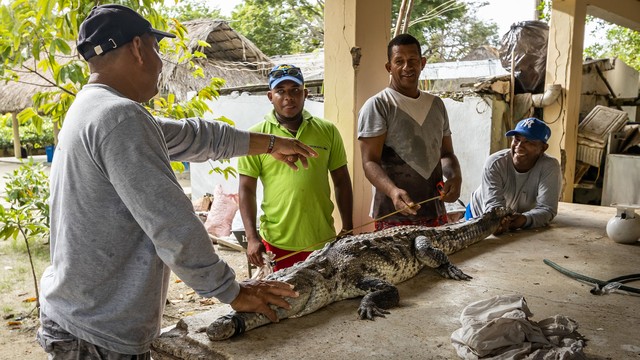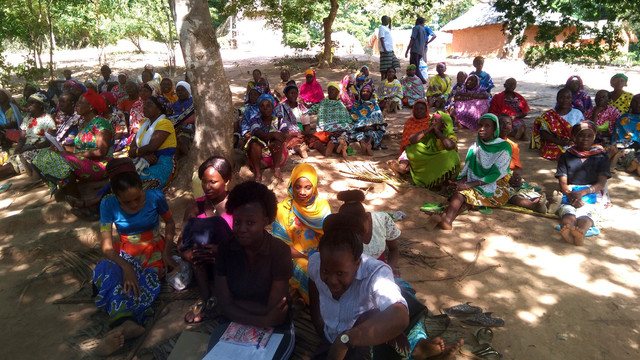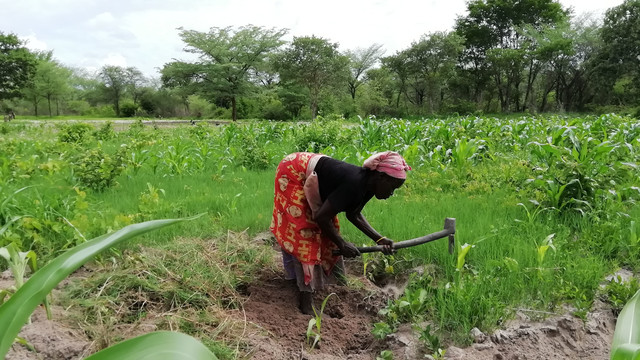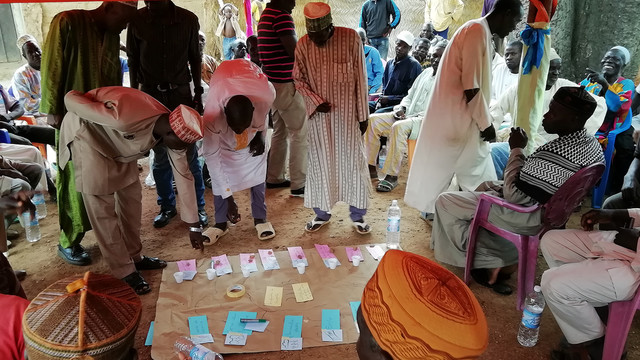PCLG: a small grants initiative for locally led action on the links between people and great ape conservation
A programme of work showing how IIED is building capacity to understand and implement equitable conservation and enhance community voice in conservation policymaking.
The call for proposals to the small grants initiative is now closed and applications are no longer being accepted.
Researcher (nature-climate), Natural Resources/Climate Change research groups

Trekking through Bwindi Impenetrable Forest National Park, Uganda (Photo: Jon Gos via Flickr, CC BY 2.0)
IIED has coordinated PCLG since its formation in 2005 as the Poverty and Conservation Learning Group – an international learning group that interrogated the links between biodiversity conservation and poverty reduction.
Over 15 years the group evolved, with national chapters formed in Cameroon, the Democratic Republic of Congo (DRC) and Uganda, and a brief history of the initiative and its achievements are available in a timeline.
In 2020, PCLG – now known as the People and Conservation Learning Group – piloted providing small grants to local groups and Indigenous Peoples’ organisations to tackle challenges related to people and great ape conservation.
Following positive feedback on this pilot, and with support from the Arcus Foundation, in 2023 PCLG started its next chapter operating exclusively as a small grants initiative.
PCLG small grants initiative
The PCLG small grants initiative seeks to get money to where it matters to support locally-led action. IIED does not define what an eligible activity should include, but rather supports applicants to self-determine their priorities related to opportunities or challenges arising from interactions between people and great ape conservation.
In this round of the small grants initiative, the design and delivery has been heavily influenced by the principles for locally led adaptation (LLA) – a set of eight principles that seek to shift power and decision-making to the local level that are now endorsed by more than 100 governments and organisations.
The PCLG small grants initiative has a particular focus on how these principles can be applied to funding for nature conservation and locally-led action more broadly. This includes consideration for working in multiple languages, different currencies, and using application and reporting methods that work for the local context, such as videos and voice notes.
We want to ensure the funding is more easily accessible to local organisations and to avoid unnecessary administrative barriers. The aim is for these funds to reach the local level where conservation efforts can have the greatest impact for people and great apes.
Over 2023-24, we will be working closely with grantees to capture lessons from this small grants initiative and will share what has worked and what hasn’t for getting money to where it matters.
How does it work?
The PCLG small grants initiative is led by IIED, with support from in-country PCLG ‘champions’: national representatives in Cameroon, the Democratic Republic of Congo and Uganda who ensure local communities and organisations working on people and great ape conservation have access to the initiative and are supported to submit their applications.
IIED and the PCLG national champions are working together to design, launch and publicise the initiative, to support successful grantees throughout the duration of the granting cycle, and to collect lessons on what has worked well about the initiative this year, and what challenges have been faced. This will be critical for shaping future rounds of the small grants initiative.
We will reflect in particular on how we could improve the design of the initiative in the future to make funding more accessible to local communities.
PCLG national champions
The PCLG team is made up of in-country national champions and members of IIED.

If you are applying in Uganda, your national champion is Atuheire Brian.
Atuheire Brian has eight years’ experience in environmental/biodiversity conservation and climate change decision making. His experience includes reducing human-wildlife conflicts, illegal wildlife trade through advocacy, and improving the livelihoods of those that live adjacent to Ugandan National Parks and Reserves.

If you are applying in DRC, your national champion is Dominique Bikaba.
Dominique is the founding member and executive director of Strong Roots Congo, a conservation and sustainable development non-governmental organisation based in the Democratic Republic of the Congo.
For over 25 years, Dominique has worked to design and oversee conservation and sustainable development programmes that aim to balance the needs of humans with those of forests and wildlife.

If you are applying in Cameroon, your national champion is Timothée Emini.
Timothée is from the Indigenous Baka community, native to the East region of Cameroon. He holds a Master's degree in public law, is a doctoral student and currently holds the position of facilitator of the platform of Indigenous Peoples of the forests of Cameroon ‘Gbabandi’.

IIED team.
Nicola Sorsby is a nature-climate researcher. She works on projects bridging nature, people and climate with a particular focus on supporting locally-led action. She will lead the PCLG small grants initiative this year in close coordination with the in-country PCLG champions.
Transparency
We aim to be as transparent as possible about the PCLG small grants initiative, in line with principle 7 of the LLA principles.
When the information is available, we will publish information here on who the successful grantees are and how much of IIED’s grant from Arcus passed directly through to grantees.
Successful grantees
Successful grantees from the 2023 granting cycle include:
Indigenous knowledge processes of The Batwa, Uganda
- Organisation: Progressive Think Tank Ltd
- Grant value: US$3,500
Key project activities:
- Document Indigenous knowledge processes of The Batwa, how they can be used in gorilla conservation and contribute to policy and conservation
- Organise a meeting of stakeholders to disseminate the research to groups including Indigenous Batwa, civil society organisations, local government representatives
- Produce a policy brief, research report and deliver a radio talk show to disseminate research results
Media strategy for gorilla conservation, Uganda
- Organisation: Integrated Green Media Foundation Ltd
- Grant value: $7,410
Key project activities:
- Develop a media strategy to enable communicators and journalists to use their platforms for gorilla conservation
- Carry out communication and awareness-raising activities to enable key stakeholders to understand the links between tea growing and logging activities, gorilla conservation and poverty alleviation around the Bwindi conservation areas
- Develop media learning and conservation groups to determine key conservation challenges and the areas where the media can use their platforms to mitigate these challenges
- Organise capacity building workshops for local communities and media houses to raise awareness on issues surrounding gorilla and human conflicts and how the media can help to mitigate them
Chimpanzee conservation in Bugoma forest, Uganda
- Organisation: Youth for Green Communities (YGC)
- Grant value: $6,221
Key project activities:
- Organise community meetings with Bugoma communities to create awareness of the tourism potential of Bugoma forest to promote conservation for the forest and green economic activities for community livelihoods
- Engage kikube district local leaders to protect chimpanzees and other wildlife species in Bugoma forest
- Establish youth and women conservation groups to mobilise host community members and authorities to take conversation action and spearhead income-generating activities in Bugoma host communities
- Conduct research on the impacts of increased sugarcane growing and emerging oil activities on chimpanzee and Bugoma forest conservation
- Organise two radio talk shows in Bunyoro region to encourage communities in Bunyoro region to protect Bugoma forest and promote green economic alternatives, as well as expose competing land-use interests
- Produce advocacy materials like community petitions, opinion articles, advocacy letters and communiques on threats to Bugoma forest and its tourism potential
Study of human-ape Interactions in the Basimwenda Community Forest, adjacent to the Itombwe Nature Reserve in Eastern DRC
- Organisation: Action Communautaire pour le Développement et la Conservation (ACDC)
- Grant value: $6,875
Key project activities:
- Survey of the local population's perception of great apes and recording of interactions between great apes and humans, as well as their distance from human dwellings and crop fields around the community forest
- Counting the number of groups and individuals of great apes and production of a map of their spatial distribution in the community forest
- Training threeyouths from the local community in methods of monitoring the great ape population and how to interact safely with great apes
Dialogue with artisanal miners for the conservation of great apes in Oku, DRC
- Organisation: Réseau Communautaire pour la biodiversité d’Oku (RCO)
- Grant value: $5,550
Key project activities:
- Hold a meeting with natural resources users and other artisanal miners to seek their commitments in favour of great ape conservation
- Strengthen the capacity of volunteer focal points chosen in different villages in the complaint management mechanism
- Hold a workshop to develop and define surveillance and control strategies in the event of crop depredation
Strengthening the resilience of pygmy indigenous peoples for inclusive and participative conservation of the Kahuzi-Biega National Park (PNKB) through myciculture, DRC
- Organisation: Kalehe Arabica Coffee Cooperative (KACCO)
- Grant value: $7,499
Key project activities:
- Reduce threats to great apes through popularisation of myciculture (cultivation of edible mushrooms) among 60 pygmy peoples
- Select the participants and form a working group to train them on domestic mushroom growing, from production to marketing
- Support participants in the mushroom-growing activities
- Market the production of domestic mushrooms grown by participants
Conservation of great apes in the Itombwe Nature Reserve, DRC
- Organisation: Jeunes et Champions en Conservation de la Nature (JCCN)
- Grant value: $6,000
Key project activities:
- Organising a workshop to raise awareness of the conservation statutes of plant and animal species present in and around the Itombwe Nature Reserve
- Organising awareness campaigns on the importance of conservation of great apes and their habitats
- Organising an information-sharing workshop on the penalties for different offences provided for in Congolese law in the event of crimes against great ape species and their habitats
Traditional knowledge of women and girls for conservation, Cameroon
- Organisation: L'association des femmes et filles dynamiques d'Eschiambor
- Grant value: 3,000,000 XAF
Key project activities:
- Set up home gardens
- Support women in agricultural activities
- Support women in the collection of non-timber forest products
- Establish income-generating activities to empower rural women
Creation of ecological fields in the Océan department, Cameroon
- Organisation: Mpo’ong ya nkwano
- Grant value: 3,000,000 XAF
Key project activities:
- Creation of ecological fields near houses
- Training communities on land rights
Creation of agroecological home gardens in Mintom, Cameroon
- Organisation: Association ABAWONI
- Grant value: 4,000,000 XAF
Key project activities:
- Reducing human-wildlife conflict and ensuring community food security through the creation of agroecological home gardens
- Organising three community meetings
- Purchasing tools and seeds
News and updates
Publications
Donors
The People and Conservation Learning Group’s small grants initiative is funded by the Arcus Foundation.
